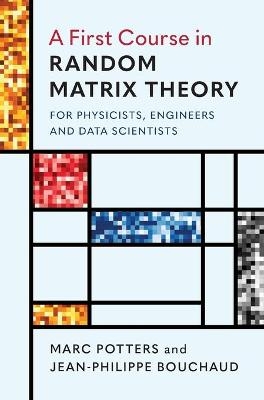
A First Course in Random Matrix Theory
Cambridge University Press (Verlag)
978-1-108-48808-2 (ISBN)
The real world is perceived and broken down as data, models and algorithms in the eyes of physicists and engineers. Data is noisy by nature and classical statistical tools have so far been successful in dealing with relatively smaller levels of randomness. The recent emergence of Big Data and the required computing power to analyse them have rendered classical tools outdated and insufficient. Tools such as random matrix theory and the study of large sample covariance matrices can efficiently process these big data sets and help make sense of modern, deep learning algorithms. Presenting an introductory calculus course for random matrices, the book focusses on modern concepts in matrix theory, generalising the standard concept of probabilistic independence to non-commuting random variables. Concretely worked out examples and applications to financial engineering and portfolio construction make this unique book an essential tool for physicists, engineers, data analysts, and economists.
Marc Potters is Chief Investment Officer of CFM, an investment firm based in Paris. Marc maintains strong links with academia and as an expert in Random Matrix Theory, he has taught at UCLA and Sorbonne University. He is co-author of Theory of Financial Risk and Derivative Pricing (Cambridge 2003). Jean-Philippe Bouchaud is a pioneer in Econophysics. His research includes random matrix theory, statistics of price formation, stock market fluctuations, and agent-based models for financial markets and macroeconomics. His previous books include Theory of Financial Risk and Derivative Pricing (Cambridge, 2003) and Trades, Quotes & Prices (Cambridge, 2018), and he has been the recipient of several prestigious, international awards.
Preface; Part I. Classical Random Matrix Theory: 1. Deterministic Matrices; 2. Wigner Ensemble and Semi-circle Law; 3. More on Gaussian Matrices; 4. Wishart Ensemble and Marcenko-Pastur Distribution; 5. Joint Distribution of Eigenvalues; 7. The Jacobi Ensemble; Part II. Sums and Products of Random Matrices: 8. Addition of Random Variables and Brownian Motion; 9. Dyson Brownian Motion; 10. Addition of Large Random Matrices; 11. Free Probabilities; 12. Free Random Matrices; 13. The Replica Method; 14. Edge Eigenvalues and Outliers; Part III. Applications: 15. Addition and Multiplication: Recipes and Examples; 16. Products of Many Random Matrices; 17. Sample Covariance Matrices; 18. Bayesian Estimation; 19. Eigenvector Overlaps and Rotationally Invariant Estimators; 20. Applications to Finance; Appendix A. Appendices: Mathematical Tools; List of Symbols; Index.
| Erscheinungsdatum | 15.01.2021 |
|---|---|
| Zusatzinfo | Worked examples or Exercises |
| Verlagsort | Cambridge |
| Sprache | englisch |
| Maße | 175 x 250 mm |
| Gewicht | 820 g |
| Themenwelt | Informatik ► Datenbanken ► Data Warehouse / Data Mining |
| Mathematik / Informatik ► Mathematik ► Angewandte Mathematik | |
| Technik | |
| ISBN-10 | 1-108-48808-0 / 1108488080 |
| ISBN-13 | 978-1-108-48808-2 / 9781108488082 |
| Zustand | Neuware |
| Informationen gemäß Produktsicherheitsverordnung (GPSR) | |
| Haben Sie eine Frage zum Produkt? |
aus dem Bereich


